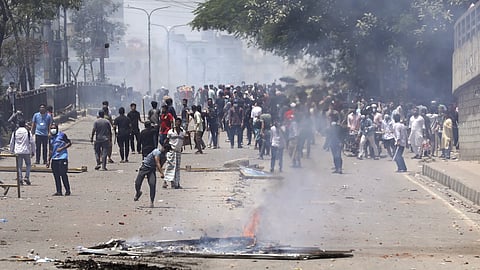

NEW DELHI: The political impasse continues in Bangladesh with student leaders turning down Prime Minister Sheikh Hasina’s offer of talks. The Chief of Army Staff (CAS) discussed troop deployment with officers at the Army headquarters and announced there would be no further firing on protesters.
"In his final remarks (while addressing army officials), the CAS said there would be no further firing by the Army. He also mentioned that if the transition of power happened in a non-democratic way, then Bangladesh would become like Kenya. He said these were the worst protests since 1971," said a source from Bangladesh.
"We are confident that the Army means well as they are under oath and not like the Pakistani Army who would threaten to carry out a coup. The protesters have rejected the offer of the Prime Minister for talks. They are demanding her resignation now," Professor Nazmul Ahsan Kalimullah, a political commentator in Bangladesh, told The New Indian Express.
The protesters plan to launch a non-cooperation movement across the country from August 4 and have urged the public to avoid going to work, paying bills for gas, water, electricity and complying with government norms.
"If the non-cooperation movement becomes effective, then the government will have to declare a state of emergency, and my reading is if things don’t settle, then martial law could be imposed," Professor Kalimullah added.
The Army chief blamed the police for the violence and justified the Army’s deployment amidst the chaos to restore normalcy.
"This is a revolution in the making. We will prevail and the regime will fall soon. I call upon the people of Bangladesh to prepare for a second republic," exiled Bangladeshi blogger and human rights activist Pinaki Bhattacharya told The New Indian Express.
Meanwhile, 7100 out of the 8500 Indian students in Bangladesh have returned to India. There were a total of 15,000 Indians in Bangladesh and they are free to return if challenges exist, though the overall situation is less volatile now.